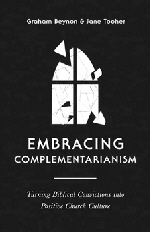"Embracing Complementarianism: Turning Biblical Convictions into Positive Church Culture" -- By: Josh Hayward
Journal: Eikon
Volume: EIKON 06:2 (Fall 2024)
Article: "Embracing Complementarianism: Turning Biblical Convictions into Positive Church Culture"
Author: Josh Hayward
Eikon 6.2 (Fall 2024) p. 156
Embracing Complementarianism: Turning Biblical Convictions into Positive Church Culture
Josh Hayward serves as Senior Pastor of Kinney Baptist Church in Austin, TX. He received his undergraduate degree in Biblical Studies from Moody Bible Institute in Chicago, IL and his Masters of Divinity in Biblical Counseling from The Southern Baptist Theological Seminary in Louisville, KY. He is married to Christina, his high school sweetheart, and they have four sons and one daughter.

Graham Beynon and Jane Toher. Embracing Complementarianism: Turning Biblical Convictions into Positive Church Culture. The Good Book Company, 2022.
Intro
If there was ever a time a book needed to be written on building a positive culture of complementarianism in the church, it is now. With a plethora of resources addressing the alleged harms of complementarianism (or the harms of its distortions), I have been longing for a book that paints a positive picture of its beauty in church life. Even more, I have been longing for a book that teaches church leaders how to cultivate a culture in the church that happily and whole-heartedly embraces and lives out complementarian convictions. In short, a book like Embracing Complementarianism: Turning Biblical Convictions into Positive Church Culture is needed. Graham Beynon and Jane Tooher sought to fill this gap within complementarian literature. I believe they accomplished this task in some ways, but I found the book wanting in other ways.
Summary
The thesis of their book is straightforward: “Our conviction is that teaching and practicing a more robust complementarianism leads people from a reluctant acceptance to a joyful embracing of God’s word in this area” (12). Their goal is not to defend complementarianism per se; they assume a complementarian framework. Their goal is to take the conversation “wider,” “deeper,” and to make it “positive” (13).
Positives
Many praises may be given to this book,
Eikon 6.2 (Fall 2024) p. 157
but I will limit myself to four. First, the authors provide a helpful balance of commendation and warning of differing views among complementarians. They recognize the two primary camps (with a range in between): broad and narrow (32–34, 42–43, 54–55). They helpfully show some of the strengths and potential weaknesses of each. In their words, “A lot of writing on gender leans in one of those two directions [overplaying the differences or denying the similarities in gender], but we must hold together similarity and difference as the basis of our relationsh...
Click here to subscribe
